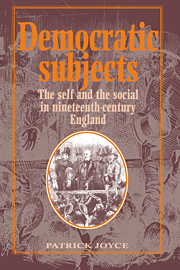Book contents
- Frontmatter
- Contents
- List of plates
- Acknowledgements
- Introduction
- Part One The sorrows of Edwin Waugh: a study in ‘working-class’ identity
- Part Two John Bright and the English people: a study in ‘middle-class’ identity
- Part Three Democratic romances: narrative as collective identity in nineteenth-century England
- Appendices
- Index
Part One - The sorrows of Edwin Waugh: a study in ‘working-class’ identity
Published online by Cambridge University Press: 10 December 2009
- Frontmatter
- Contents
- List of plates
- Acknowledgements
- Introduction
- Part One The sorrows of Edwin Waugh: a study in ‘working-class’ identity
- Part Two John Bright and the English people: a study in ‘middle-class’ identity
- Part Three Democratic romances: narrative as collective identity in nineteenth-century England
- Appendices
- Index
Summary
The miseries of servitude, and the double-distilled misery of ignorance … the wretched retributions that hang over men's faults! I am a most miserable sorrowful soul – no not a soul. It is the want of soul within me that makes me grieve. But I am in very earnest both a continual and a secret sorrower and the only thing I have truly to rejoice at is this fast-abiding grief that I am what I am, and what I ought not to be – O God, this holy sorrow if it be not weak I beseech thee fortify it according to thy will. This sorrow for the depravity of my mental and moral condition is a divine treasure which I pray thee to preserve to me, and increase in me – Every hour convinces me of the insufficiency of man of himself to preserve and uplift himself … O God, my life is fleeting and I am lingering helplessly in misery and slavery of mind and spirit …
(Edwin Waugh, Diary, 6 November 1847)What a pitiful thing is man, or rather the curious animal that bears the name – unless he be a continual conqueror over the wrong within him and without. He is right heir to the majestic… if he has the character to march into his own territory and take possession… I am sometimes as wise as fifty Solomons for a few minutes in speech and writing but in hard active life there are few greater fools between me and Pendle Hill.
(Edwin Waugh, Diary, 20 March 1850)- Type
- Chapter
- Information
- Democratic SubjectsThe Self and the Social in Nineteenth-Century England, pp. 21 - 30Publisher: Cambridge University PressPrint publication year: 1994



